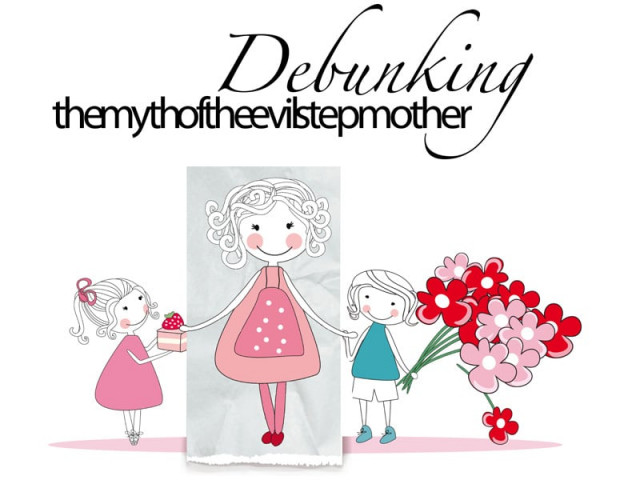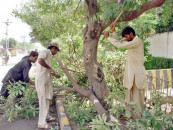Debunking the myth of the evil stepmother
Ms.T explores if we are right to regard the ‘other mother’ in such a way.

Debunking the myth of the evil stepmother
If a mother reprimands her child, it is justified and natural for she is simply fulfilling her motherly duties. But catch a stepmother doing so and there will be a storm of disapproval. We have all seen plenty of family soap operas with the hackneyed storyline of the evil stepmother terrorizing her innocent stepchildren to understand that the mother and stepmother do not hold the same leverage. If the stepmother so much as raises her voice at her stepchild, everyone from her husband to her in-laws regard it as abuse. She is not seen as a woman putting her heart and soul into raising someone else’s child but a monster trying to wreak havoc and all she hears is, “If the child was her own, she would never have done that.”

Such is the astringent reality of being a stepmother, be it in Pakistan or anywhere else in the world. The role of the ‘other mother’ is highly demonized in the media as well, often depicted as a character possessing only negative traits and evil aspirations, programming us to feel the same. Cinderella’s stepmother made her a maid in her own home so we must hate her. Baroness von Schraeder of The Sound of Music intended to send the von Trapp kids away to boarding school once she became their stepmother and hence, we must hate her too. But this morbid image of stepmothers is a far cry from reality which makes it even more challenging for real-world stepmothers to live up to their role. In reality, being a stepmother is a daunting task.
Although Shahana’s* experience of adjusting within her family has been fairly pleasant compared to that of other stepmothers, thanks to the support of her husband, she admits that playing the heavily criticized role is difficult, especially with all the negative connotations attached to it. “Keeping this in mind, I have to make a conscious effort to be friendly and forgiving with my stepchildren and not interfere in their lives too much,” she confesses. “I always choose my words wisely to avoid giving them any wrong thoughts that can [strenghten] negative ideas they might have about me,” Shahana adds.

Agreeing with Shahana, Integrative Psychotherapist Anees Fatima Hakeem (Therapy Works Pakistan) explains, “There are clear negative ideals with regard to stepmothers that have been derived from popular culture, like movies and fairytales.” Unfortunately, this may cloud our judgement of a particular person regardless of how they might actually be. Dr Hakeem also adds, “Humans have a tendency to stereotype people as either good or bad when in reality, we consist of both. Add to this the antagonistic cultural notions we have of stepmothers and it becomes a gargantuan task for them to contend with the extended family, not just the stepchildren!”

Maria* was eight and her brother five when her father remarried, two years after the passing of their birth mother. “Our stepmother looked after us like we were her own and never let us feel the absence of our real mother.” Their stepmother’s devotion was so strong that when she had a baby daughter of her own, she would not dote on her in front of Maria and her brother lest they feel ignored. Despite this, however, their relationship was put to the test when upon Maria’s twelfth birthday, her stepmother began teaching her things young adults ought to know and disciplining her. Maria confesses that around this time, she developed a strong dislike for her stepmother which was amplified further by a relative she was close with. “I was told bad things about my stepmother, like she didn’t love me anymore and her real daughter had taken my place.” Hoping to exploit Maria’s impressionable age, the extended family tried their best to sabotage the relationship but ultimately failed as Maria instead took to expressing her feelings to her stepmother. In response, her stepmother became even nicer to and from there on, they have shared a very pleasant relationship together.
On the other hand, Laila* has not been as lucky as Maria’s stepmother in assimilating into her family. At the time of her wedding, her three and six-year-old stepchildren had been abandoned by their birth mother and the deprivation of a mother figure made them fall in love with Laila instantly. Unfortunately, merely one year into her marriage, the birth mother returned and shook their happy little world. Soon, the children began to distance themselves from Laila and often complained to their real mother about her, who in turn fuelled their ill-feeling and tried to manipulate their young minds. Oftentimes, when they would return from their birth mother’s house, they would seem to have been fed all sorts of false things about Laila. “I had the worst time trying to make them do their homework, finish their meals or clean their rooms,” says Laila, ruefully. “They wanted to do things their own — or their mother’s — way and if I scolded them, they retaliated by reminding me I was not their real mother.”
Laila speculates that these difficulties could have been avoided entirely had her husband been supportive. On the contrary, she complains that, “Every time I try to discipline them, the children throw a fit and my husband says I am being unreasonable. Not to mention, he calls up his ex-wife to console the children which makes me feel horrid, like I am trying to harm them in some way.” Ultimately, the drama seeps into Laila’s marriage and the atmosphere in the house becomes depressing. “I love my children and would do anything for their happiness,” says Laila. “But I have not been given the right to say anything to them. Nothing hurts me more than watching them love their real mother more. But alas, she will always be their real mother no matter what.”
However, there are some ways to avoid the family drama and bridge the gap between stepmothers and their families. Dr Hakeem suggests creating firm boundaries that are strong enough to control the children’s behaviour but not too strong to make them rebellious. A child should be allowed to express anger but not use foul language, for example. This allows feelings to be heard and trust to develop. Also, as with all regular families, “If children sense that their parents are not united, they can manipulate situations to their advantage.” Hence, it is advisable that a couple maintains a united front no matter what their parenting style.
Dr Hakeem also highlights instances of when the stepmother-child relation can prove beneficial for the family. “If the relationship with the birth mother was traumatic, say she was depressed and neglected the child, then closeness with the stepmother can be hugely reparative,” she explains. “The stepmother must remain open-minded and allow the child to express suppressed feelings, even if they are negative. This kind of behaviour has more to do with the child than the stepmother personally. She must remember that!” Naturally, if the adult is emotionally unstable, he or she will be unable to cope with a child’s instability. Dr. Hakeem prescribes therapy in such cases as it encourages the parents to work on their own issues before others.
At times, angry children find it difficult to show their vulnerable selves because their life experiences have taught them that it is not always safe to do. These children often resort to violence. In such cases, any act of kindness from the stepmother can aggravate them more because to show their vulnerabilities is unimaginable for them; their emotional wounds are guarded by a powerful sense of self-preservation that keeps them closed off from others. “We can help this issue via therapy too,” suggests Dr Hakeem. “One-on-one therapy sessions with the child in question work best!”
It is now high time that we make an effort to abrogate the distorted perception we have developed of stepmothers and accept them into society as people. We must relieve them from concocted biases and recognize that for every wicked stepmother that might exist, there are a hundred more that have nothing but affection for their stepchildren and must be given due praise and a fighting chance.
*Names have been changed for privacy
Popular stepmother good and bad
1) Asmat Aara from Humnasheen: This dichotomous character keeps us guessing her true intentions from the start to finish, despite raising her stepchildren with the utmost devotion.
2) Jia from Tanhai: Forcefully married to an older man, Jia is shocked to meet her two stepchildren on her wedding night. But, this does not stop her from accepting and raising them as her own and eventually, winning their hearts.
3) Atiqa from Kadoorat: Atiqa is faced with many problems at the hands of the troubled minor, including a brief row with a live snake! Nonetheless, Atiqa is genuine in her efforts to win her stepdaughter’s affection and maintains a cordial relationship throughout.
4) Ulfat from the PTV serial Aanch: While her husband is a kind-hearted and humble man, Ulfat’s three stepchildren refuse to accept her into their family and the story revolves around the difficult time she undergoes because of them. However, patience and tolerance help Ulfat turn things in her favour and she emerges successful in the end.
5) Eleanor Mason from Desperate Housewives: As Bree’s uptight and rude stepmother to whom appearance means everything, Eleanor doesn’t even budge when her step son-in-law Andrew is suffering a heart attack.
6) Mrs. Dashwood from Sense & Sensibility: Left in severe financial straits by her late husband’s death, Mrs. Dashwood gives her stepdaughters support against their greedy sister-in-law and even moves to a new city to save them from the family feud.
Published in The Express Tribune, Ms T, August 18th, 2013.
Like MsT on Facebook, follow @TribmagMsT on Twitter for your dose of girl talk.


















COMMENTS
Comments are moderated and generally will be posted if they are on-topic and not abusive.
For more information, please see our Comments FAQ